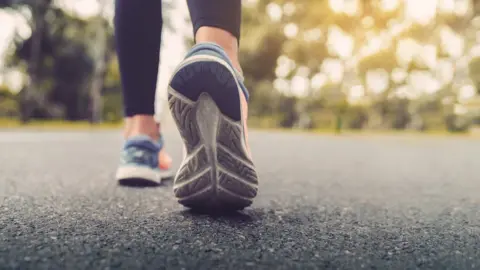Covid: Slow walkers 'more likely to die', study finds
 Getty Images
Getty ImagesPeople who walk slowly may be nearly four times more likely to die from Covid-19, a new study has found.
Health researchers based in Leicester concluded slow walkers with a "normal" weight were 3.75 times more likely to die from the virus than brisk walkers.
The project used data collected from more than 400,000 middle-aged people.
Lead researcher Prof Tom Yates said self-reported walking pace could be used to predict whether someone was at higher risk from the virus.
The study, run by the National Institute for Health Research (NIHR) Leicester Biomedical Research Centre, was designed to explore links between body mass index (BMI) and self-reported walking pace with the risk of contracting severe Covid-19 and mortality.
It used self-reported data from 412,596 people who participate in UK Biobank, a biomedical database and research study.
Slow walking was considered to be at a speed of less than three miles (4.8km) per hour, steady/average speed was three to four miles (6.4km) per hour, and brisk at more than four miles per hour.
Researchers also found slow walkers were 2.5 times more likely to develop severe Covid-19 than those in the fastest bracket.
Risk was uniformly high in normal weight slow walkers and slow walkers with obesity.
However, researchers noted that self-reported walking pace was subject to possible reporting bias and therefore no definitive causal conclusions could be derived from the results.
Prof Yates, a specialist in physical activity, sedentary behaviour and health at the University of Leicester, said: "We know already that obesity and frailty are key risk factors for Covid-19 outcomes.
"This is the first study to show that slow walkers have a much higher risk of contracting severe Covid-19 outcomes, irrespective of their weight.
"Ongoing public health and research surveillance studies should consider incorporating simple measures of physical fitness such as self-reported walking pace in addition to BMI, as potential risk predictors of Covid-19 outcomes."
The study's findings have been published in the International Journal of Obesity.

Follow BBC East Midlands on Facebook, Twitter, or Instagram. Send your story ideas to [email protected].
